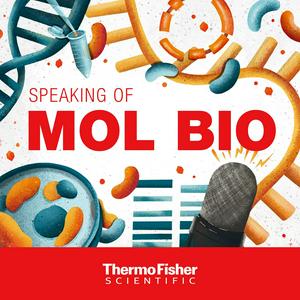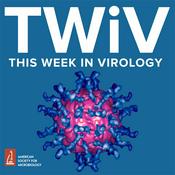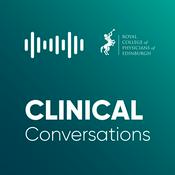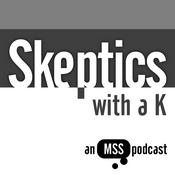46 episodes
- In this Mol Bio Minutes mini-episode, Laurynas Alijošius shares how Rolling Circle Amplification (RCA) provides a reliable, high-yield approach for amplifying circular DNA prior to next-generation sequencing (NGS). This isothermal method avoids the need for thermal cycling and even bypasses the need for specific primers—making it ideal for challenging viral genomes, rare targets, or field samples.
Powered by the strand-displacing phi29 DNA polymerase, RCA amplifies DNA with impressive sensitivity and minimal GC bias. Laurynas breaks down the steps of multiple displacement amplification (MDA), explains why exonuclease-resistant primers are important, and explores how engineered polymerases like EquiPhi29™ DNA Polymerase dramatically improve yield and reduce reaction times. RCA products can be cleaned up and debranched to support a range of downstream workflows, including nanopore sequencing and transcriptomics.
From single-cell genomics to phage-based applications and in vitro expression systems, RCA is more than just a pre-NGS step; it’s a versatile tool with broad utility. Whether you're stabilizing viral RNA or tackling ultra-low-input samples, RCA and whole genome amplification offer new flexibility for today’s demanding sequencing workflows.
Subscribe to get future episodes as they drop and if you like what you’re hearing we hope you’ll share a review or recommend the series to a colleague.
Visit the Invitrogen School of Molecular Biology to access helpful molecular biology resources and educational content, and please share this resource with anyone you know working in molecular biology.
For Research Use Only. Not for use in diagnostic procedures. - Applyo Jena is building a freeze-dried future, one bead at a time. In this episode, Dr. Hanno Hermann and Dr. Thanh Tu Hellmich-Duong walk us through how their lyo-bead technology emerged from the challenges of field-based HIV diagnostics and evolved into a flexible platform that stabilizes everything from enzymes to magnetic nanoparticles, without the need for refrigeration.
From diagnostics research to therapeutics, this lyophilization platform is solving key pain points in reagent formulation, shipping, and field use. Hanno and Thanh Tu explain how lyo-beads offer precise, single-use reagent doses with near-instantaneous rehydration, minimal batch-to-batch variability, and extended ambient temperature stability. Whether it's for isothermal RT-LAMP, next-gen sequencing prep, or phage-based application, Applyo’s platform unlocks new formats, simplifies logistics, and lowers the environmental burden of molecular workflows.
With new hires, new markets, and new product lines on the horizon, Applyo Jena is poised for a decade of growth and maybe even a hand in reshaping the way freeze-dried pharmaceuticals are developed and delivered.
Subscribe to get future episodes as they drop and if you like what you’re hearing we hope you’ll share a review or recommend the series to a colleague.
Visit the Invitrogen School of Molecular Biology to access helpful molecular biology resources and educational content, and please share this resource with anyone you know working in molecular biology.
For Research Use Only. Not for use in diagnostic procedures. - In this Mol Bio Minutes episode, Thermo Fisher Scientific’s Monika Jazdauskaitė dives into the versatile world of Recombinase Polymerase Amplification (RPA). Unlike PCR, RPA operates at a constant, low temperature (around 37–42°C), enabling fast, equipment-light workflows that are ideal for field diagnostics and decentralized labs. Monika explains how the method works and why RPA is emerging as a go-to technique for both DNA and RNA target detection.
She highlights RPA’s specificity, sensitivity, and robustness against common inhibitors like ethanol and heparin, critical for applications like respiratory pathogen detection or low-quality sample inputs. Plus, she shares how RPA’s gentle conditions and lyophilization compatibility make it a strong candidate for stabilizing next-generation sequencing (NGS) libraries, especially those with high GC content.
Whether you're looking to simplify pathogen detection or streamline your sequencing prep, RPA offers a compelling alternative to traditional amplification. And with ready-to-use kits like the Invitrogen™ Lyo-ready RPA Kit, Thermo Fisher is helping researchers bring speed and stability to molecular workflows, all with no thermal cycler required.
Subscribe to get future episodes as they drop and if you like what you’re hearing we hope you’ll share a review or recommend the series to a colleague.
Visit the Invitrogen School of Molecular Biology to access helpful molecular biology resources and educational content, and please share this resource with anyone you know working in molecular biology.
For Research Use Only. Not for use in diagnostic procedures. - In this episode of Speaking of Mol Bio, Dr. Andre Ghetti, CEO of AnaBios, offers a deep dive into the world of translational preclinical research. AnaBios is redefining early human insights by using ethically sourced, functional human tissues and cells to generate actionable data before compounds ever enter clinical trials. Ghetti walks us through the company’s approach of offering human-relevant safety and efficacy data, validating drug targets, and supporting everything from small startups to major pharma groups.
We learn how AnaBios engages with clients to customize assays, especially in high-need areas like non-opioid pain therapies, fibrosis, and cardiac safety, and how they use a blend of standardized and novel functional assays, some of which required building their own hardware. He also discusses their integration of RT-PCR, RNA-seq, and calcium imaging, including genetically encoded sensors to monitor neuronal activity at scale.
From their use of machine learning to analyze massive data sets, to collaborations with the FDA, to their unique ability to preserve tissue viability across the U.S., AnaBios offers a powerful glimpse into the future of translational biology. Dr. Ghetti also shares advice for young scientists and reflects on what’s next for AnaBios, including oncology and stem-cell model integration.
Subscribe to get future episodes as they drop and if you like what you’re hearing we hope you’ll share a review or recommend the series to a colleague.
Visit the Invitrogen School of Molecular Biology to access helpful molecular biology resources and educational content, and please share this resource with anyone you know working in molecular biology.
For Research Use Only. Not for use in diagnostic procedures. - In this Mol Bio Minutes episode, Thermo Fisher Scientific's Dr. Agnė Alminaitė unveils an exciting new approach for assay developers: Dry-Ready™ reagents for RT-LAMP and RT-qPCR. These innovations eliminate the need for lyophilizers by enabling air drying of molecular assays in a standard heating oven, producing room temperature-stable assays in under two hours.
Agnė walks listeners through how Dry-Ready differs from traditional Lyo-Ready™ and lyophilization methods, while delivering similar stability and performance. She explains the critical role of thermostable enzymes and specially developed excipient mixes that protect enzyme function during the drying process.
The episode introduces two new kits: the Dry-Ready™ RT-LAMP Kit, ideal for flexible assay development and point-of-care settings, and the one-step Dry-Ready™ RT-qPCR Kit, a powerful tool for simplified, dual-function reactions. Both kits are customizable and empower even small labs to stabilize assays without complex equipment.
Whether you're commercializing a kit or looking to simplify your workflow, this episode offers actionable insight into next-generation assay stabilization. And don't miss the special promo code below!
Helpful resource links mentioned in this episode:
Learn more about air-drying and lyophilization for assay stabilization.
Visit the product pages for the Dry-Ready products Agnė introduced:Invitrogen Dry-Ready™ RT-qPCR Kit
Invitrogen Dry-Ready™ RT-LAMP Kit
Access all Thermo Fisher Scientific promotional offers
Access your exclusive Speaking of Mol Bio promotional offerEnter code “CAZDUA” if in the U.S.
Enter code “CZ7F19” in in Canada
Subscribe to get future episodes as they drop and if you like what you’re hearing we hope you’ll share a review or recommend the series to a colleague.
Visit the Invitrogen School of Molecular Biology to access helpful molecular biology resources and educational content, and please share this resource with anyone you know working in molecular biology.
For Research Use Only. Not for use in diagnostic procedures.
More Science podcasts
Trending Science podcasts
About Speaking of Mol Bio
Speaking of Mol Bio, a podcast series from Thermo Fisher Scientific, discusses trending applications in science and the molecular biology aspects of those applications. Our host delves in to deep discussion with CEOs, R&D scientists, researchers, and key opinion leaders across the globe. Speaking of Mol Bio helps scientific curious people - from all scientific and non-scientific backgrounds - understand how modern molecular biology applications can help push the boundaries in medicine, science, drug discovery, and in the cure and treatment of diseases.
Music from NOWHERE by ikson™ (https://www.iksonmusic.com)
Podcast websiteListen to Speaking of Mol Bio, StarTalk Radio and many other podcasts from around the world with the radio.net app

Get the free radio.net app
- Stations and podcasts to bookmark
- Stream via Wi-Fi or Bluetooth
- Supports Carplay & Android Auto
- Many other app features
Get the free radio.net app
- Stations and podcasts to bookmark
- Stream via Wi-Fi or Bluetooth
- Supports Carplay & Android Auto
- Many other app features


Speaking of Mol Bio
Scan code,
download the app,
start listening.
download the app,
start listening.






































